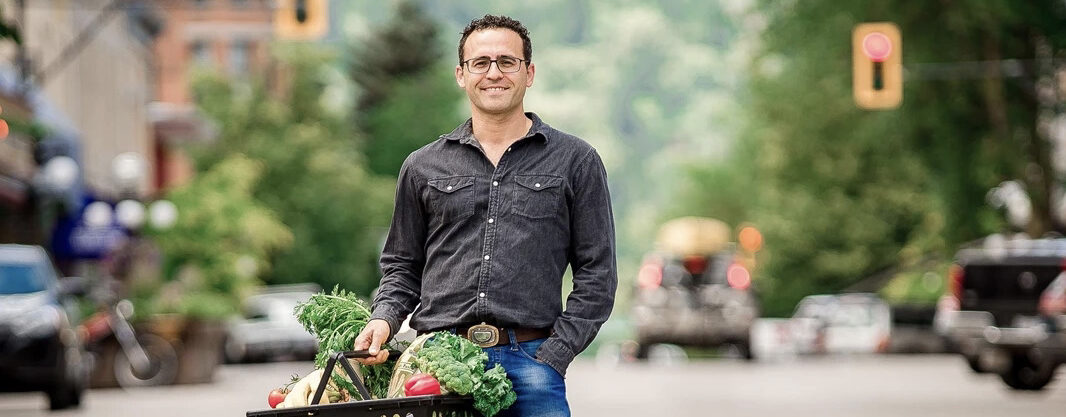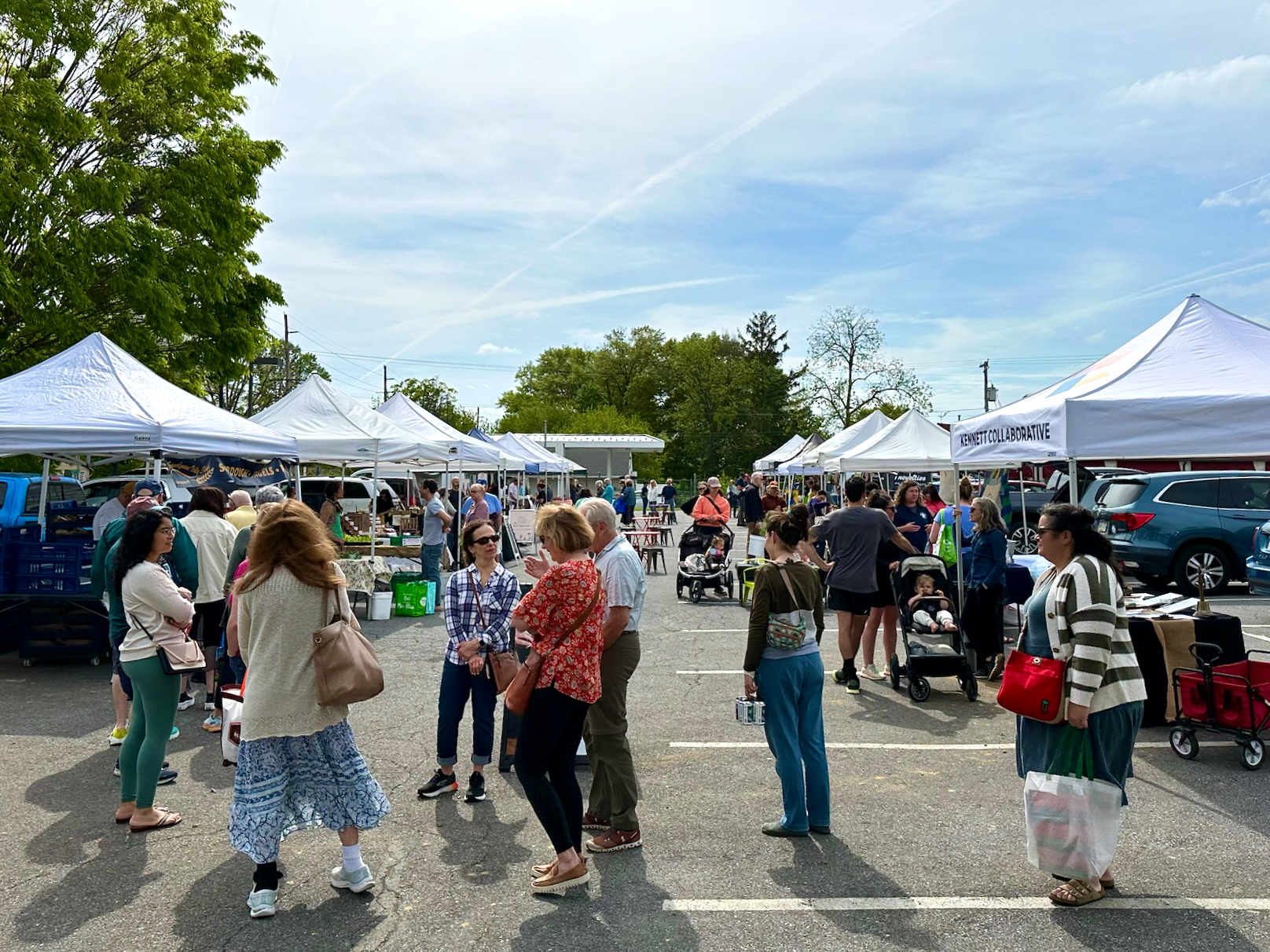Many local residents have questions about what food co-ops are, how they help the community, and why it’s important to support them. Steinman will answer these questions and more in a talk entitled “Building a Better Community with a Community-Owned Grocery Store” on Thursday, April 13th, where he will make the case for a food co-op in Kennett Square as an alternative to “the corporate giant’s grocery store.” This event, which is part of the Kennett Collaborative Speaker Series and co-presented with Kennett Community Grocer, will be held at the Presbyterian Church of Kennett Square on South Broad Street. Click here to RSVP.
“Jon Steinman has devoted his career to promoting the notion that people from four different groups—everyone who grows, sells, buys, and eats food—is part of one ecosystem,” says Kennett Community Grocer (KCG) board president Edie Burkey. “That ecosystem is at its best—environmentally, economically, and for our own health—when it’s totally local.”
Many are familiar with the concept of the carbon footprint of the food we eat. The further our food has to travel, the higher the impact on the environment. Conversely, the fresher and more local food is, the higher its nutritional value—and the better it tastes. Anyone who shops the KSQ Farmers Market, for example, understands the difference between a carrot stick in a plastic bag and the real thing, fresh from the earth.
But what is less widely understood, Burkey says, is the depth and breadth of influence a community-owned grocery store can have in terms of ensuring food access and equity, being a significant engine of local revenue, supporting local agriculture, and even in making sustainable decisions about food waste. When a community understands the interconnectedness of all of these decisions, and a community-owned enterprise makes these options easily available, significant and lasting change can be achieved.
“If you have interest in the ability of the land to continue to sustain the people who live here, then you will have interest in how a food co-op can support your interest in the land, the community, and future generations,” Burkey says.
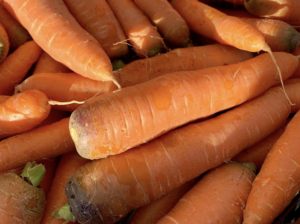
Anyone who shops the KSQ Farmers Market, for example, understands the difference between a carrot stick in a plastic bag and the real thing, fresh from the earth. (Photo: Flying Plow Farm carrots at the KSQ Farmers Market)
Kennett Community Grocer: Four Years On
In December 2018, the newly formed board of the Kennett Square Food Co-op (now Kennett Community Grocer) held a public meeting in The Garage Youth Center to share their dream: a member-owned and operated one-stop grocery store, or co-op, in Kennett Square. The store would provide the whole community with nutritious local food, create living-wage jobs, and offer access to nutrition education. This passionate group of pioneers, led by then-president Britton Elwood, pointed to countless other towns—in Pennsylvania and around the world—that have come together to open community-owned stores.
In the four years since that initial meeting, a small but dedicated group of Kennett Community Grocer board members and volunteers have worked tirelessly towards making the store here a reality. Most recently, they engaged a national expert to conduct a market study. The study concluded that the Kennett area can support a community-owned store of roughly 4,000 square feet and also projected a solid sales forecast. With this confirmation, the group is shifting its focus for 2023 to locating a site, in or near the Borough, for the store.
When people hear about Kennett Community Grocer, they often ask where the store is. But the model is not a top-down, corporate “build it and they will come” one. Rather, a food co-op is built by the community, for the community. “We simply can’t do it without community support,” Burkey says. “We need to expand our membership to at least 500 before we can start to build a store.”

With over 1,300 member-owners and significant community support, the Bethlehem Food Co-op is under construction and slated to open this summer.
Burkey cites, as inspiration, the example of Bethlehem, Pennsylvania. The movement for a community-owned grocery store there has been on a similar trajectory and timetable to that in Kennett Square. With a burgeoning membership of over 1,300 people, Bethlehem Food Co-op has received millions in grant funding and is opening a huge “community-owned, ‘everyone welcome’ grocery store” this summer. Kennett has the potential and the resources to do something similar, Burkey says, and national expert Jon Steinman agrees.
To join Kennett Community Grocer, there is a one-time Member-Owner equity payment of $300, and the impact of each member’s contribution is enormous.
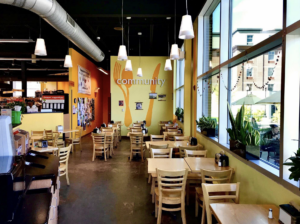
Community-owned grocery stores often feature welcoming and versatile gathering spaces like this one at the Monadnock Food Co-op in Keene, NH. (Photo: Jon Steinman, “This Could Be Ours”)
A national expert sees Kennett’s potential
Burkey has been a great proponent of food co-ops, including Weavers Way in Philadelphia, since the 1970s. She’s a prolific reader and came across Steinman’s book Grocery Story: The Promise of Food Co-ops in the age of Grocery Giants when she first joined the Kennett Community Grocer board and started a book club at the library. She found the book so helpful and inspiring that she wrote to Steinman to ask whether he would attend one of their meetings via Zoom. He agreed. “He was so personable and down to earth,” Burkey says, “and he really understands the concept of a cooperative space.”
Steinman was also delighted to accept the invitation to come to Kennett Square next month to talk about the great potential he sees for Kennett Community Grocer. In addition to being an expert on the process of creating an alternative food ecosystem, some of which he shares in an online multimedia project called Deconstructing Dinner: Reconstructing our Food System, he is one of the leaders of the largest food cooperative in Canada, the Kootenay Co-op. There’s a more local connection, too. Some of the founders of the Kootenay Co-op, which started after the Vietnam War, Burkey says, were Pennsylvania Quakers.
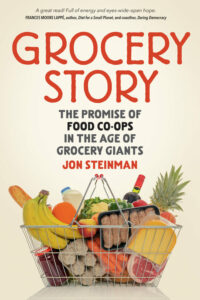
Copies of Jon Steinman’s book “Grocery Story” will be available for purchase at the Speaker Series event on April 13th.
Saving the land, saving ourselves
One of the frustrating and sometimes debilitating struggles for local farmers and producers, who can’t afford to pay to place their products in national chains, is retailing their products. “Corporate grocery stores are very detrimental to local farmers,” Burkey says. Co-op grocery stores, on the other hand, contract with local vendors to buy a certain amount of product. This relationship works like a giant CSA, Burkey says. It gives local vendors more stability and gives consumers access to products that support their own health and that of the land and their community. While supermarkets have efficiently and systematically taken wealth out of local communities, locally owned grocery stores effectively restore that vital revenue—and the attendant power to make better choices for the health of the community.
Farmers markets and local food co-ops around the world are complementary and collaborative partners, Burkey says, working together to support farmers, promote equitable access to food, and build community. “As the organization that runs the weekly KSQ Farmers Market, Kennett Collaborative has been invested in supporting local agriculture and sustainable food culture for over twenty years,” says Executive Director Daniel Embree. “We hope you’ll come to the next installment in our Speaker Series to meet some of our Farmers Market growers. We’re excited to collaborate with Kennett Community Grocer to bring a leading expert to Kennett so that folks can learn more about our local food economy and the possibilities a food co-op could bring to our community.”
The Kennett community has embraced the concept of building a legacy for future generations through initiatives including support for land preservation throughout Southern Chester County and building the new Kennett Library & Resource Center. Kennett Community Grocer will have just as lasting and significant an impact for present and future generations here in Southern Chester County.
Jon Steinman believes we can. Click here to RSVP to the event on April 13th to learn more.
The event will also be live-streamed here.
